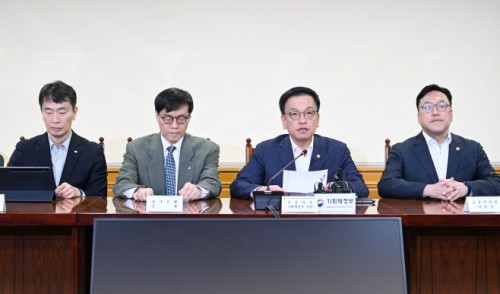 |
| Choi Sang-mok, deputy prime minister and minister of economy and finance, delivers opening remarks during a macroeconomic and financial issues meeting at the Bankers Association in Jung-gu, Seoul, on April 3. / Source: Yonhap News |
On April 3, Deputy Prime Minister and Minister of Economy and Finance Choi Sang-mok addressed the potential market volatility stemming from the U.S. government's reciprocal tariff measures. He emphasized that the South Korean government is prepared to implement all available market stabilization measures if excessive fluctuations occur.
Speaking at a macroeconomic and financial issues meeting held at the Bankers Association in Seoul, Choi stated, "If market volatility expands excessively, we will immediately implement all market stabilization measures according to our contingency plans." He noted that the U.S. reciprocal tariff actions are expected to cause sustained high volatility in global financial markets, with sensitive reactions anticipated in domestic financial and foreign exchange markets.
Choi highlighted that the government has been meticulously preparing contingency plans through the F4 meetings to address potential increases in financial and foreign exchange market volatility. He assured that a 24-hour joint monitoring system involving relevant agencies will remain operational until market conditions stabilize, with specific monitoring systems for foreign exchange, government bonds, and capital markets also in place.
In light of the imminent imposition of high reciprocal tariffs, Choi mentioned that, as discussed in the recent emergency trade ministers' meeting chaired by the acting president, the government will now focus all efforts on comprehensive responses. The F4 meetings will play an active role in this endeavor. The government plans to conduct thorough analyses of U.S. tariff policies to minimize economic damage through negotiations. Additionally, the Economic Security Strategy Task Force will collaborate with the private sector to devise optimal response strategies.
Choi also indicated that the Industrial Competitiveness Enhancement Ministers' Meeting will sequentially announce detailed support measures for industries expected to be affected, such as the automotive sector, including expanding refund guarantees for shipbuilding. He added that the government's proposed 10 trillion won supplementary budget will actively incorporate projects to address trade risks, including additional supply of trade finance and export vouchers, as well as stabilizing supply chains for key items.
He urged the National Assembly for prompt discussions to assist domestic companies in navigating unprecedented trade challenges. Furthermore, Choi emphasized that, alongside these efforts, the government will pursue structural improvements in the economy and industry in response to changes in the global trade environment. This includes diversifying export markets through the development of new markets, enhancing fundamental industrial competitiveness based on technology rather than price, and strengthening policy efforts to protect domestic employment.
Most Read
-
1
-
2
-
3
-
4
-
5
-
6
-
7





















